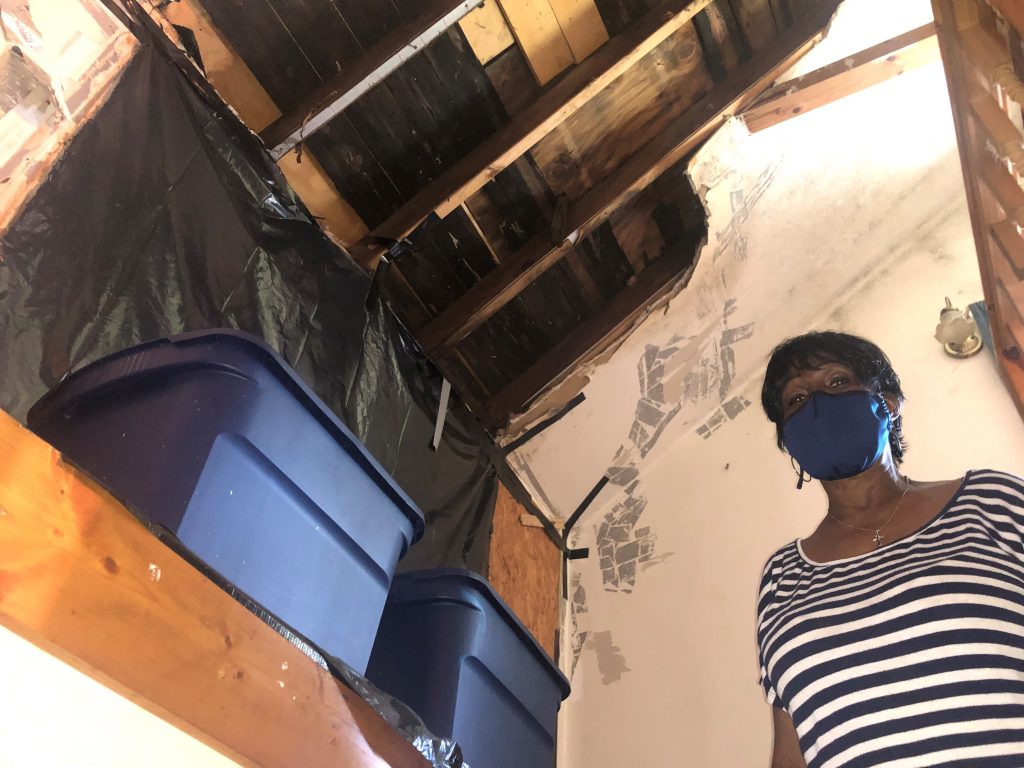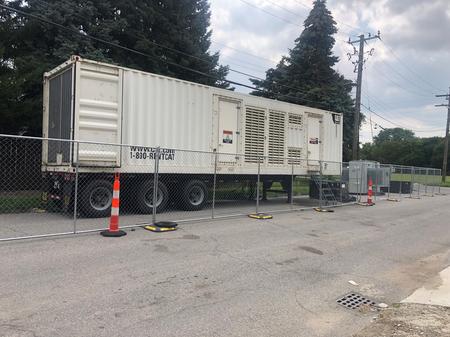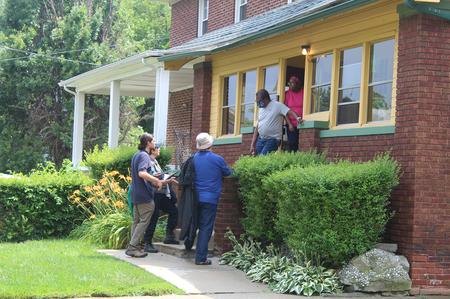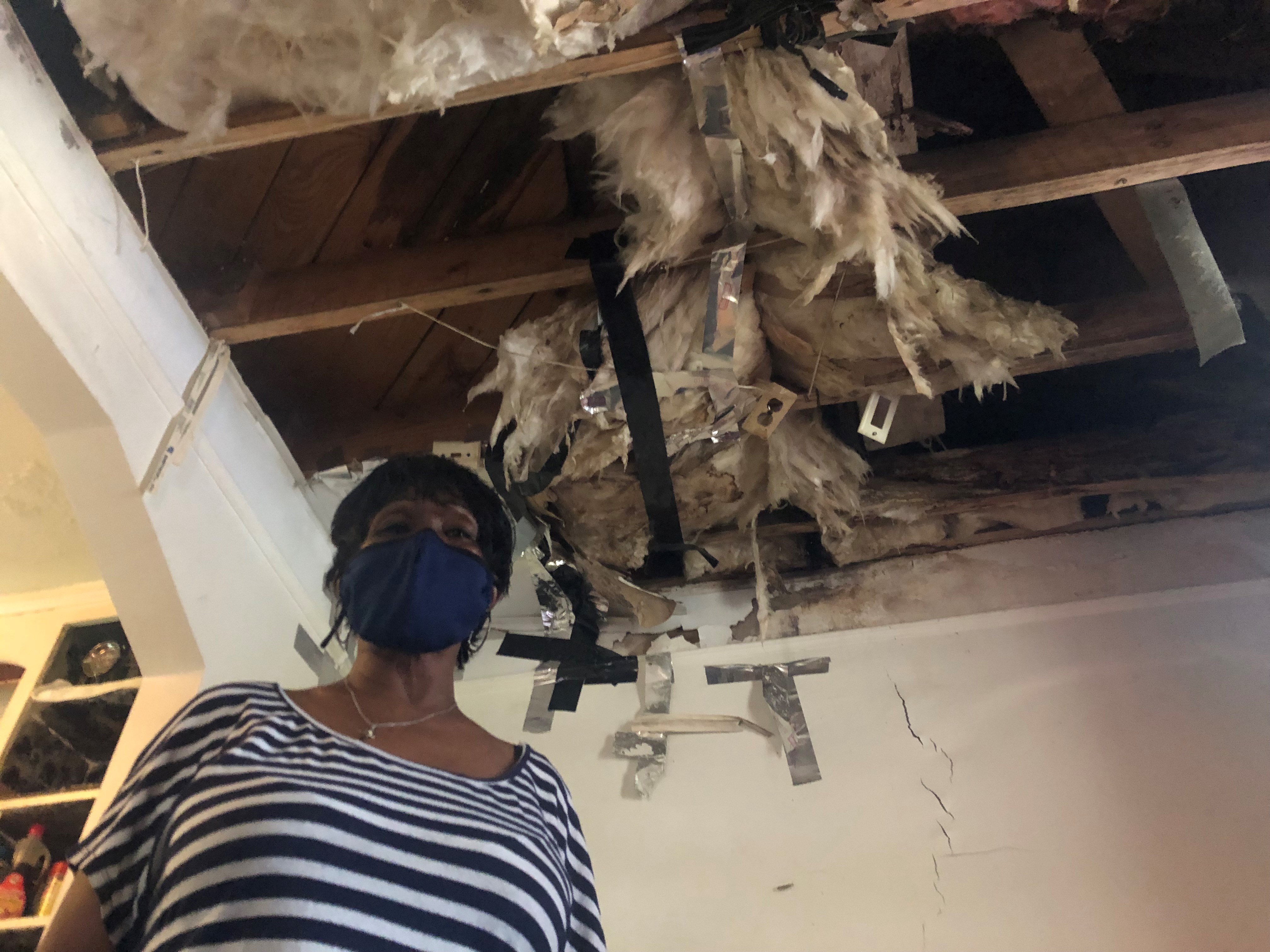Weeks After Storms, Detroiters Wait For Help
Hundreds of thousands of homes in Southeast Michigan have been damaged by flooding and electrical outages this summer. Some are left to cover the costs of recovery on their own, even with aid flowing in from the federal government.

There’s been a familiar hum for some residents living in Southwest Detroit. It comes from a diesel-powered generator the size of a semi-truck. DTE Energy set it up near some electrical lines after the storms hit in June. It’s still powering parts of the neighborhood weeks later.
This summer, Southeast Michigan has been battered by heavy winds and rain. The floods and power outages that followed affected hundreds of thousands — during the worst blackout of the year, more than 850,000 households in Michigan lost power. And that was only the latest outage that happened this year. Residents are still dealing with the aftermath weeks after a federal disaster was declared in Wayne and Washtenaw counties.
Residents Don’t Know Where to Turn

“The first issue was getting the flood,” says Pablo Sanchez, who runs a flower nursery from his home near the generator. “The second one, we lose the power. So that was two things at once.”
Sanchez lost a couple of appliances in the flood. He doesn’t know if his furnace still works. He is waiting for it to get cold to test it.
“You know I paid like $3,000 not even two years ago, and I’m not sure if I’m going to be able to save it,” says Sanchez. “You know what I started making? I started putting shelves in the basement, so I don’t get these issues anymore.”
Even with the generator down the block, Sanchez says the power has gone out at least twice so far. He’s been concerned about keeping cool as temperatures in his neighborhood reach 90 degrees.

“We don’t know where to complain. The only thing we’ve been doing is just calling the 1-800 for DTE, and that’s about it,” says Sanchez. “Everyone who lives in this house, we took care of ourselves.”
Sanchez applied but he is still waiting for any financial aid.
“If they’re going to send checks to people, they can give it to us straight,” says Sanchez, as he ponders why he’s had to submit forms to track his property losses. He’s discarded receipts for many of the items he’s bought over the years that were damaged by the recent flooding.
“Just like the federal government is still sending checks to people [during the pandemic]. It’s like [tell us] this is what we can do for you, and that’s about it.”
Reimbursements Hard to Come By
While the federal government has programs for disaster relief, reimbursements from DTE Energy have been hard to come by. At most, some are getting a $100 credit from the utility.
“We know many of our customers have been challenged by the recent weather and resulting power outages, and we’re working to make the reliability credit process as easy as possible for them. DTE is proactively identifying and crediting customers who qualify for the reliability credit as defined by the Michigan Public Service Commission,” DTE Energy told WDET in a statement. The utility did not say how many customers are getting credited.
Still, the outages have confounded Detroit residents, including those campaigning for elected office this year.
“They’re getting all of these utility tax credits. And we’re approving some of this down here in City Council,” says Nicole Small, who is running for Detroit City Council at-large. “But no one ever puts in writing a demand to OK, start here, and we want to see a plan of where you’re going to start upgrading the infrastructure. It’s as simple as that.”
“We should have underground wiring,” Small adds. DTE estimates that burying the thousands of miles of overhead electrical lines in Michigan would cost at least $25 billion.
“We don’t get anything. All we do is keep getting the runaround.” –Lenora Lewis, Detroit homeowner
The Federal Emergency Management Agency is stepping in for other flood and storm-related damage — at least for some.
“FEMA is here to help Southeast Michiganders. But we can’t provide that help if individuals don’t register first,” said FEMA disaster coordinator Scott Burgess earlier this month.
FEMA says it’s approved disaster aid for more than 29,000 households in Southeast Michigan, with more than $85 million approved for assistance. Twice as many have registered for assistance, and applications are still coming in. The Small Business Administration is providing low-interest disaster loans up to $40,000 for affected individuals and businesses. Most of Detroit’s residents are renters who do not qualify for FEMA aid and would need to apply for SBA loans for federal assistance.
“I Didn’t Stay Here This Long … Just to Walk Away”

For some homeowners who have received a check from FEMA, the aid is not enough.
Lenora Lewis has extensive water damage throughout her home. Her roof needed work for years, and after the most recent storms, chunks of her ceiling fell in, ruining her carpet and floorboards.
“This is my buckets that I was using when it was coming down,” says Lewis as she points to several plastic bins she has scattered throughout her dining room. The ceiling is bursting with the pink cotton candy of exposed fiberglass insulation.
“I can’t even use my house how I really want to,” Lewis says. “Most of the time, I sleep downstairs on the couch.”
Lewis’ basement bedroom flooded this year, too. But it’s not the first time she’s had to deal with extreme wet weather. Her home has been damaged by other storms over the decade she’s lived in the house, including the 2014 floods.
“One year, it rained like eight hours straight,” Lewis says. “It’s been years since I’ve been going through this.”

Lewis says the full extent of her house’s damage has been ignored by federal officials. She says a FEMA inspector came to her house after she applied for assistance on the phone, but didn’t step inside.
“When he came out, he asked me for my identification, and when I showed him my identification, he said we can’t come in because of the virus,” said Lewis.
In the end, FEMA approved $1,500 for Lewis. She doesn’t think it will cover much. She’s also tried to reach out for local assistance with little success.
“Property tax, the water bill. It’s always something I’m trying to get some help for, but it seems like I’ve never been able to get it,” said Lewis. “I keep getting the runaround.”
For Lewis, this summer’s floods are just the latest storm she’s had to weather. She’s facing foreclosure, owning nearly $20,000 in back property taxes, even though she’s qualified for poverty exemptions over the past three years. Lewis owes more than $1,500 to the Detroit Water and Sewerage Department, and she’s not getting much help to get her out from underwater.
“I didn’t stay here this long to be going through what I’m going through just to walk away,” Lewis says. “This is my family house as far as I’m concerned, so why give up property when you don’t have to?”
Listen: Residents are still dealing with the aftermath weeks after a federal disaster was declared in Wayne and Washtenaw Counties.
Trusted, accurate, up-to-date.
WDET strives to make our journalism accessible to everyone. As a public media institution, we maintain our journalistic integrity through independent support from readers like you. If you value WDET as your source of news, music and conversation, please make a gift today.
